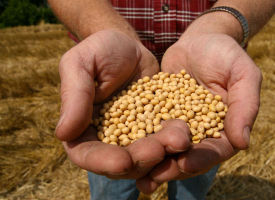Dried and husked:
Seed:
Pictures by Gretchen Quarterman for Okra Paradise Farms, Lowndes County, Georgia, 2012-11-10.
-jsq
Tom Philpott wrote for Mother Jones 19 July 2011, SEC Investigates Monsanto’s Roundup Biz
A subpoena sounds like a start. If they do a real investigation I wouldn’t be surprised if they find enough evidence to pull some licenses.The SEC is investigating Monsanto’s tactics for defending the market for its herbicide, Roundup. The news emerged just before the July 4 holiday weekend, during Monsanto’s press conference about its quarterly financial earnings. Company execs boasted of a 77 percent increase in profit before dropping a mini-bombshell, The Wall Street Journal reported:
Monsanto said it was cooperating with a previously undisclosed US Securities and Exchange Commission probe into its customer incentive programs for herbicides in fiscal years 2009 and 2010, and had received a subpoena to provide related documents.
-jsq
Forbes made Monsanto the company of the year last year in The Planet Versus Monsanto. I know because I wrote the article. Since then everything that could have gone wrong for the genetically engineered seed company….has gone wrong. Super-weeds that are resistant to its RoundUp weed killer are emerging, even as weed killer sales are being hit by cheap Chinese generics. An expensive new bioengineered corn seed with eight new genes does not look impressive in its first harvest. And the Justice Department is invesigating over antitrust issues. All this has led to massive share declines. Other publications are making fun of our cover story.Maybe Forbes should improve its “invesigating” [sic] skills.
-jsq
I remember that!As recently as late December, Monsanto was named “company of the year” by Forbes magazine. Last week, the company earned a different accolade from Jim Cramer, the television stock market commentator. “This may be the worst stock of 2010,” he proclaimed.
 The month after Forbes did that,
Covalence did a survey that ranked Monsanto
the least ethical company in the world.
Worse than Philip Morris, Chevron, or Halliburton!
The month after Forbes did that,
Covalence did a survey that ranked Monsanto
the least ethical company in the world.
Worse than Philip Morris, Chevron, or Halliburton!
About that time we discovered Monsanto Corn Causes Liver and Kidney Damage in Rats, and that Monsanto’s GM soy causes sterility and five times higher infant mortality in hamsters.
Meanwhile, the
U.S. Department of Justice was
investigating Monsanto’s seed business. At least
seven U.S. states started their own
investigations, and later the U.S. EPA fined
Monsanto $2.5 million for selling seeds illegally in Texas counties where
they were banned.
Anyway, could all this bad news have some effect on Monsanto’s share price?
Continue reading  Since then we’ve learned that
Pesticides Linked to ADHD.
Specifically organophosphate pesticides.
Like Glysophate (RoundUp).
And that indicators of pesticides, including organophosphates,
are found in the urine of 95% of school children.
We already knew that
Glysophoate causes birth defects in humans.
Since then we’ve learned that
Pesticides Linked to ADHD.
Specifically organophosphate pesticides.
Like Glysophate (RoundUp).
And that indicators of pesticides, including organophosphates,
are found in the urine of 95% of school children.
We already knew that
Glysophoate causes birth defects in humans.
 Vandana Shiva writes in Huffington Post about India:
Vandana Shiva writes in Huffington Post about India:
200,000 farmers have ended their lives since 1997.In just one Indian state:
1593 farmers committed suicide in Chattisgarh in 2007. Before 2000 no farmers suicides are reported in the state.Why?
In 1998, the World Bank’s structural adjustment policies forced India to open up its seed sector to global corporations like Cargill, Monsanto and Syngenta. The global corporations changed the input economy overnight. Farm saved seeds were replaced by corporate seeds, which need fertilizers and pesticides and cannot be saved.And that’s not all: Continue readingCorporations prevent seed savings through patents and by engineering seeds with non-renewable traits. As a result, poor peasants have to buy new seeds for every planting season and what was traditionally a free resource, available by putting aside a small portion of the crop, becomes a commodity. This new expense increases poverty and leads to indebtness.